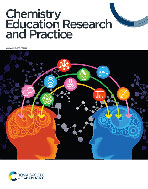Factors affecting individuals’ cognitive engagement during group work in general chemistry: timing, group size, and question type
Abstract
Understanding how individual students cognitively engage while participating in small group activities in a General Chemistry class can provide insight into what factors may be influencing their level of engagement. The Interactive–Constructive–Active–Passive (ICAP) framework was used to identify individual students’ level of engagement on items in multiple activities during a General Chemistry course. The effects of timing, group size, and question type on engagement were investigated. Results indicate students’ engagement varied more in the first half of the term, and students demonstrated higher levels of engagement when working in smaller groups or subsets of larger groups when these groups contained students with similar levels of knowledge. Finally, the relation between question type (algorithmic versus explanation) and engagement depended on the activity topic. In an activity on Solutions and Dilutions, there was a significant relation where algorithmic items had higher occurrences of Interactive engagement. The implications of this work regarding teaching and research are discussed.


 Please wait while we load your content...
Please wait while we load your content...